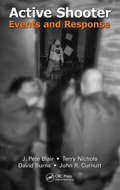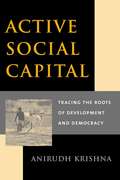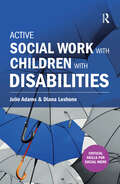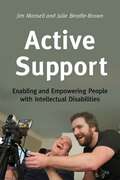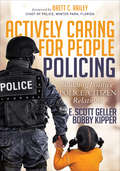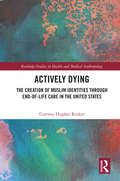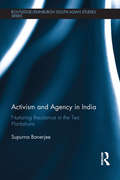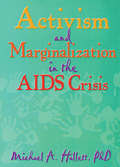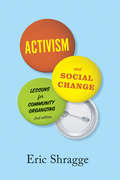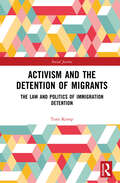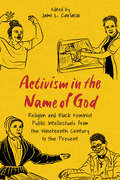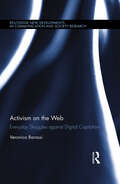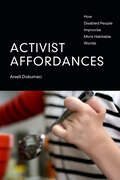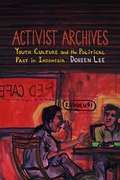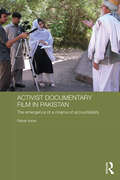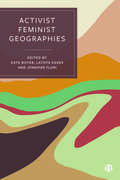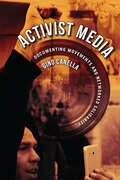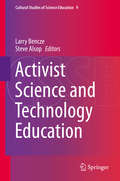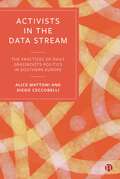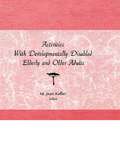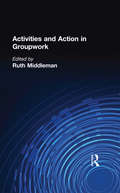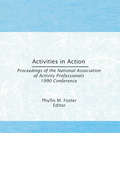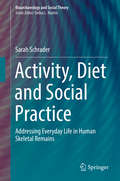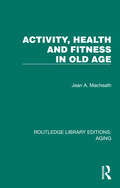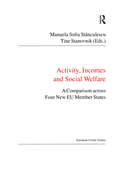- Table View
- List View
Active Shooter Events and Response
by David Burns John P. Blair Terry Nichols John R. CurnuttThe Columbine tragedy on April 20, 1999 began a new era in law enforcement as it became apparent that the police response to such mass shootings must be drastically altered. By the time the Sandy Hook Elementary School shooting occurred on December 14, 2012, outdated police response strategies had been replaced with new, aggressive tactics used by
Active Social Capital: Tracing the Roots of Development and Democracy
by Anirudh KrishnaThe idea of social capital allows scholars to assess the quality of relationships among people within a particular community and show how that quality affects the ability to achieve shared goals. With evidence collected from sixty-nine villages in India, Krishna investigates what social capital is, how it operates in practice, and what results it can be expected to produce. Does social capital provide a viable means for advancing economic development, promoting ethnic peace, and strengthening democratic governance? The world is richer than ever before, but more than a fifth of its people are poor and miserable. Civil wars and ethnic strife continue to mar prospects for peace. Democracy is in place in most countries, but large numbers of citizens do not benefit from it. How can development, peace and democracy become more fruitful for the ordinary citizen? This book shows how social capital is a crucial dimension of any solution to these problems.
Active Social Work with Children with Disabilities (Critical Skills for Social Work)
by Julie Adams Diana LeshoneActive Social Work with Children with Disabilities provides a comprehensive social worker’s guide to working with children with disabilities, exploring current issues from the perspective of both the social worker and the family. Many people are afraid of working in this field of social work and this book dispels the myths and fears about working with children with disabilities and build the social worker’s confidence in an area that is often left behind within the social work world. The book will help you to: undertake a social work assessment with a child with a disability consider the holistic needs of the child and the family explore the impact of grief and loss upon the family build emotional intelligence and resilience within families. communicate with children with disabilities communication techniques. The new SEND legislation and issues around Safeguarding of Children with Disabilities and Transition to Adult Social Care for the young person are explored, and activities and scenarios help you to critically reflect and explore theory and practice further.
Active Support
by Jim Mansell Julie Beadle-BrownActive Support is a proven model of care that enables and empowers people with intellectual disabilities to participate fully in all aspects of their lives. This evidence-based approach is particularly effective for working with people with more severe disabilities, and is of growing interest to those responsible for providing support and services. The authors provide a comprehensive overview of Active Support and how it can be used in practice, based on the theory and research underpinning the methods involved. They describe how to engage people with intellectual disabilities in meaningful activity as active participants, and look at the communication style needed to foster positive relationships between carers and the people they are supporting. Highlighting the main issues for those trying to put Active Support into practice, they explain what is needed on a day-to-day basis to support the implementation, improvement and maintenance of the approach, along with possible solutions for the difficulties they may encounter. Finally, they look at how to integrate Active Support with other person-centred approaches, drawing on examples from various organisations and individual case studies. The definitive text on Active Support, this book will be essential reading for anyone professionally concerned with the quality of life of people with intellectual disabilities, including psychologists, behaviour specialists, social workers, care managers, occupational therapists and inspectors and regulators of services, as well as families.
Actively Caring for People Policing: Building Positive Police/Citizen Relations
by E. Scott Geller Bobby KipperA revolutionary new approach to policing that puts people over punishment. Experts have struggled to define the term &“police culture.&” For most, this label means a reactive approach to keeping people safe by using punitive consequences to punish or detain the perpetrators. The result: More attention is given to the negative, reactive side of policing than a positive, proactive approach to preventing crime by cultivating an interdependent culture of residents looking out for the safety, health, and well-being of each other. In Actively Caring for People Policing, authors E. Scott Geller and Bobby Kipper show how police officers can play a critical and integral role in achieving such a community of compassion—an Actively Caring for People (AC4P) culture. With AC4P policing, consequences are used to increase the quantity and improve the quality of desired behavior. Police officers are educated about the rationale behind using more positive than negative consequences to manage behavior, and then they are trained on how to deliver positive consequences in ways that help to cultivate interpersonal trust and AC4P behavior among police officers and the citizens they serve. The result: humanistic behaviorism to enhance long-term positive relations between police officers and the citizens they serve, thereby preventing interpersonal conflict, violence, and harm.
Actively Dying: The Creation of Muslim Identities through End-of-Life Care in the United States (Routledge Studies in Health and Medical Anthropology)
by Cortney Hughes RinkerThis book explores the experiences of Muslims in the United States as they interact with the health care system during serious illness and end-of-life care. It shifts "actively dying" from a medical phrase used to describe patients who are expected to pass away soon or who exhibit signs of impending death, to a theoretical framework to analyze how end-of-life care, particularly within a hospital, shapes the ways that patients, families, and providers understand Islam and think of themselves as Muslim. Using the dying body as the main object of analysis, the volume shows that religious identities of Muslim patients, loved ones, and caregivers are not only created when living, but also through the physical process of dying and through death. Based on ethnographic and qualitative research carried out mainly in the Washington, D.C. region, this volume will be of interest to scholars in anthropology, sociology, public health, gerontology, and religious studies.
Activism and Agency in India: Nurturing Resistance in the Tea Plantations (Routledge/Edinburgh South Asian Studies Series)
by Supurna BanerjeeDuring the period 2000 to 2010, tea plantations in India experienced a crisis and were at the threshold of transformation, framed by conflict and turbulence. This book is an interdisciplinary and intersectional work examining the nature of victimhood and agency among women workers on tea plantations in North Bengal, India. The author views tea plantations as social spaces, rather than only economic units of production. Focusing on the lived experiences of the workers from the perspective of their multiple identities, the author uses the everyday as the entry point for understanding the exercise of agency, the negotiation of different spaces, gender roles and norms therein, as well as acts of protest. Agency and its relation to space are seen as continuums: from their everyday, hidden forms to the more overt and spectacular; from conformity and endurance to challenge and protest. Offering an understanding of the gendered nature of space and labour, this book examines the post-crisis period by mapping the workers’ narratives about their lived experiences and struggles in the times of economic, political and social tumult in the tea plantations of northern West Bengal. It will be of interest to an interdisciplinary audience interested in Development Studies, Gender Studies, South Asian Studies, Social Activism and Labour Studies.
Activism and Marginalization in the AIDS Crisis
by Michael A HallettActivism and Marginalization in the AIDS Crisis shows readers how the advent of HIV-disease has brought into question the utility of certain forms of “activism” as they relate to understanding and fighting the social impacts of disease. This informative and powerful book is centrally concerned about the ways in which institutionally governed social constructions of HIV/AIDS affect policy and public images of the disease more so than activist efforts. It asserts that an accounting of the power institutional structures have over the dominant social constructions of HIV disease is fundamental to adequate forms of present and future AIDS activism. Chapters in Activism and Marginalization in the AIDS Crisis demonstrate how, despite what is thought of as the “successful activism” of the past decade, the claims of the HIV-positive are still being ignored, still being marginalized, and still being administratively “handled” and exploited even as the plight of those who find themselves HIV-positive worsens. Although chapters reject the assertion that activism has been a highly effective remedy to HIV-positive voicelessness, authors do not deny that activists have been vocal, but that they continue to be ignored despite their vocality.Contributors in Activism and Marginalization in the AIDS Crisis offer numerous examples of institutional control and demonstrate that institutional structures, and not activists, are controlling the public meaning of HIV-related issues. Readers learn how messages about HIV/AIDS are produced, negotiated, modified, and sustained through institutional mechanisms that serve mostly institutional interests rather than those of the HIV-positive. In gaining an understanding of these issues, readers will begin to learn how to modify and strengthen activist efforts with valuable insight on: the lack of HIV-positive voices in mainstream news portrayals of HIV/AIDS research on constructions of HIV-disease at the state government level social constructions and how they affect HIV/AIDS policy the political construction of AIDS and interest-based struggles the emergent “bio-politics” of HIV and homosexuality in the U.S. how institutional power works to govern public understanding of HIV diseaseInstitutional structures are defined in this book as groups engaged in and defined by the production of various “truths” which sustain them. Institutional power may be defined as the capacity to regulate, constrain, and disseminate versions of “truth.” Activism and Marginalization in the AIDS Crisis reveals how HIV activist groups have been outmaneuvered when it comes to the production and dissemination of various “truths” about HIV/AIDS by institutional structures more deeply steeped in social legitimacy and which have a superior capacity for message dissemination.HIV/AIDS activists, HIV-positive persons and those with AIDS, HIV/AIDS educators, public and institutional policymakers, health professionals, and the general public will find this book essential to understanding the social constructions of HIV/AIDS, how these affect HIV/AIDS-related policy and public opinion, and how to begin to cipher through the plethora of information to find and promote the “truth.”
Activism and Social Change: Lessons For Community And Local Organizing
by Eric ShraggeDrawing on over thirty years of experience in community development practice, Eric Shragge offers a unique historical perspective on activism, linking various forms of local organizing to the broader goal of fundamental social change. This new edition places contemporary community organizing in a post-9/11 context and includes a discussion of national and international organizing efforts—in the Middle East, in the Occupy movement, in European resistance to austerity measures, and in recent student protests in Quebec. A new chapter-length case study covering Shragge's long-term involvement with the Immigrant Workers Centre in Montreal offers one of the few English-language discussions of community organizing in Quebec. Activism and Social Change is an excellent core or supplementary text in courses on social movements, community organizing, or community development.
Activism and the Detention of Migrants: The Law and Politics of Immigration Detention (Social Justice)
by Tom KempThis book is an empirically grounded, critical engagement with the politics of immigration detention and deportation. Focusing on the constitutive tensions and political generativity within the activist practices of the anti-detention movement, this book examines the distinction between representational and post-representational political sensibilities. Representational politics centres on representing the interests of disenfranchised people to the state and public and operates primarily within the regime of immigration law. Post-representational politics focuses on working collaboratively with those in detention, to resist and challenge the deportation system. Since representational politics is the predominant political imaginary of migrant rights campaigning, the book focuses on illustrating and evaluating the role of post-representational politics. The book argues that the concept of post-representational politics is important for understanding and participating in radical opposition to state racism. This argument rests on the expanded possibilities it motivates of engaging with and resisting institutions that are poised to co-opt resistance; the attention it fosters to the situated power dynamics of political activities that collaborate with imprisoned people; and its sensitivity to the politically and conceptually generative capacities of everyday, embodied practices of resistance. To make this argument, this book employs innovative methodology to illuminate and engage with the practice-based thinking of activist movements about the concepts of solidarity, hospitality, witnessing and accountability. This book will be of interest to scholars and activists with interests in socio-legal studies of immigration and refugee law, as well as others in social movement studies, critical legal studies, border criminology and critical theory.
Activism in the Name of God: Religion and Black Feminist Public Intellectuals from the Nineteenth Century to the Present (Margaret Walker Alexander Series in African American Studies)
by Jami L. CarlacioContributions by Janet Allured, Lisa Pertillar Brevard, Jami L. Carlacio, Cheryl J. Fish, Angela Hornsby-Gutting, Jennifer McFarlane-Harris, Neely McLaughlin, Darcy Metcalfe, Phillip Luke Sinitiere, P. Jane Splawn, Laura L. Sullivan, and Hettie V. WilliamsActivism in the Name of God: Religion and Black Feminist Public Intellectuals from the Nineteenth Century to the Present recognizes and celebrates twelve Black feminists who have made an indelible mark not just on Black women’s intellectual history but on American intellectual history in general. The volume includes essays on Jarena Lee, Theressa Hoover, Pauli Murray, and Alexis Pauline Gumbs, to name a few. These women’s commitment to the social, political, and economic well-being of oppressed people in the United States shaped their work in the public sphere, which took the form of preaching, writing, singing, marching, presiding over religious institutions, teaching, assuming leadership roles in the civil rights movement, and creating politically subversive print and digital art. This anthology offers readers exemplars with whose minds and spirits we can engage, from whose ideas we can learn, and upon whose social justice work we can build.The volume joins a burgeoning chorus of texts that calls attention to the creativity of Black women who galvanized their readers, listeners, and fellow activists to seek justice for the oppressed. Pushing back on centuries of institutionalized injustices that have relegated Black women to the sidelines, the work of these Black feminist public intellectuals reflects both Christian gospel ethics and non-Christian religious traditions that celebrate the wholeness of Black people.
Activism on the Web: Everyday Struggles against Digital Capitalism (Routledge New Developments in Communication and Society Research)
by Veronica BarassiActivism on the Web examines the everyday tensions that political activists face as they come to terms with the increasingly commercialized nature of web technologies and sheds light on an important, yet under-investigated, dimension of the relationship between contemporary forms of social protest and internet technologies. Drawing on anthropological and ethnographic research amongst three very different political groups in the UK, Italy and Spain, the book argues that activists’ everyday internet uses are largely defined by processes of negotiation with digital capitalism. These processes of negotiation are giving rise to a series of collective experiences, which are defined by the tension between activists’ democratic needs on one side and the cultural processes reinforced by digital capitalism on the other. In looking at the encounter between activist cultures and digital capitalism, the book focuses in particular on the tension created by self-centered communication processes and networked-individualism, by corporate surveillance and data-mining, and by fast-capitalism and the temporality of immediacy. Activism on the Web suggests that if we want to understand how new technologies are affecting political participation and democratic processes, we should not focus on disruption and novelty, but we should instead explore the complex dialectics between digital discourses and digital practices; between the technical and the social; between the political economy of the web and its lived critique.
Activist Affordances: How Disabled People Improvise More Habitable Worlds
by Arseli DokumaciFor people who are living with disability, including various forms of chronic diseases and chronic pain, daily tasks like lifting a glass of water or taking off clothes can be difficult if not impossible. In Activist Affordances, Arseli Dokumacı draws on ethnographic work with differently disabled people whose ingenuity, labor, and artfulness allow them to achieve these seemingly simple tasks. Dokumacı shows how they use improvisation to imagine and bring into being more habitable worlds through the smallest of actions and the most fleeting of movements---what she calls “activist affordances.” Even as an environment shrinks to a set of constraints rather than opportunities, the improvisatory space of performance opens up to allow disabled people to imagine that same environment otherwise. Dokumacı shows how disabled people’s activist affordances present the potential for a more liveable and accessible world for all of us.
Activist Archives: Youth Culture and the Political Past in Indonesia
by Doreen LeeIn Activist Archives Doreen Lee tells the origins, experiences, and legacy of the radical Indonesian student movement that helped end the thirty-two-year dictatorship in May 1998. Lee situates the revolt as the most recent manifestation of student activists claiming a political and historical inheritance passed down by earlier generations of politicized youth. Combining historical and ethnographic analysis of "Generation 98," Lee offers rich depictions of the generational structures, nationalist sentiments, and organizational and private spaces that bound these activists together. She examines the ways the movement shaped new and youthful ways of looking, seeing, and being--found in archival documents from the 1980s and 1990s; the connections between politics and place; narratives of state violence; activists' experimental lifestyles; and the uneven development of democratic politics on and off the street. Lee illuminates how the interaction between official history, collective memory, and performance came to define youth citizenship and resistance in Indonesia's transition to the post-Suharto present.
Activist Documentary Film in Pakistan: The Emergence of a Cinema of Accountability (Routledge Contemporary South Asia Series)
by Rahat ImranThis book, the first academic book on Pakistani documentary cinema, traces the development of activist filmmaking practices in Pakistan which have emerged as a response to the consequences of religious fundamentalism, extremism, and violation of human rights. Beginning with the period of General Zia-ul-Haq’s Islamization process (1977-88), it discusses a selection of representative documentary films that have critically addressed and documented the various key transformations, events, and developments that have shaped Pakistan’s socio-political, socio-economic, and cultural history. Such activist filmmaking practice in Pakistan is today an influential factor in addressing the politics, and negative and oppressive effects of the Islamization era, discriminatory laws, particularly gender-discriminatory Sharia laws, violation of human and citizen rights, authoritarianism, internal strife, the spread of religious fundamentalism, and the threat of Talibanization, and oppressive tribal customs and traditions. The contribution of Pakistani documentary filmmakers stands as a significant body of work that has served the cause of human rights, promoting awareness and social change in Pakistan, particularly regarding gender rights.
Activist Feminist Geographies
by Kate Boyer, LaToya E. Eaves, and Jennifer FluriExploring what it means to enact feminist geography, this book brings together contemporary, cutting-edge cases of social justice activism and collaborative research with activists. From Black feminist organizing in the American South to the stories of feminist geography collectives in Latin America, the editors present contemporary case studies from the global north and south. The chapters showcase the strength and vibrancy of activist-engaged scholarship taking place in the field and serve as a call to action, exploring how this work advances real-world efforts to fight injustice and re-make the world as a fairer, more equitable, and more accepting place.
Activist Media: Documenting Movements and Networked Solidarity
by Gino CanellaNow more than ever, activists are using media to document injustice and promote social and political change. Yet with so many media platforms available, activists sometimes fail to have a coherent media and communication strategy. Drawing from his experiences as a documentary filmmaker with Black Lives Matter 5280 and Service Employees International Union (SEIU) Local 105 in Denver, Colorado, Gino Canella argues that activist media create opportunities for activists to navigate conflict and embrace their political and ideological differences. Canella details how activist media practices—interviewing organizers, script writing, video editing, posting on social media, and hosting community screenings—foster solidarity among grassroots organizers. Informed by media theory, this book explores how activists are using media to mobilize supporters, communicate their values, and reject anti-union rhetoric. Furthermore, it demonstrates how collaborative media projects can help activists build broad-based coalitions and amplify their vision for a more equitable and just society.
Activist Science and Technology Education (Cultural Studies of Science Education #9)
by Larry Bencze Steve AlsopThis collection examines issues of agency, power, politics and identity as they relate to science and technology and education, within contemporary settings. Social, economic and ecological critique and reform are examined by numerous contributing authors, from a range of international contexts. These chapters examine pressing pedagogical questions within socio-scientific contexts, including petroleum economies, food justice, health, environmentalism, climate change, social media and biotechnologies. Readers will discover far reaching inquiries into activism as an open question for science and technology education, citizenship and democracy. The authors call on the work of prominent scholars throughout the ages, including Bourdieu, Foucault, Giroux, Jasanoff, Kierkegaard, Marx, Nietzsche, Rancière and Žižek. The application of critical theoretical scholarship to mainstream practices in science and technology education distinguishes this book, and this deep, theoretical treatment is complemented by many grounded, more pragmatic exemplars of activist pedagogies. Practical examples are set within the public sphere, within selected new social movements, and also within more formal institutional settings, including elementary and secondary schools, and higher education. These assembled discussions provide a basis for a more radically reflexive reworking of science and technology education. Educational policy makers, science education scholars, and science and technology educators, amongst others, will find this work thought-provoking, instructive and informative.
Activists in the Data Stream: The Practices of Daily Grassroots Politics in Southern Europe
by Alice Mattoni Diego CeccobelliAvailable Open Access digitally under CC-BY-ND licence This book pulls back the curtain on the link between activism, media and technology in the quiet times of politics when people are not protesting. Introducing the novel concept of the ‘data stream', it explores the intricate ways in which activists interact daily with various types of data and how they navigate the impact of digitalization and datafication on today’s grassroots politics. Through rich, empirical data from Greece, Spain and Italy, Activists in the Data Stream makes a nuanced contribution to our understanding of activists’ daily political engagement in an ever-changing media and political landscape.
Activities With Developmentally Disabled Elderly and Older Adults
by M Jean KellerLearn how to effectively plan and deliver activities for the growing number of older people with developmental disabilities. Activities With Developmentally Disabled Elderly and Older Adults is an innovative new book that aims to stimulate interest and continued support for recreation program development and implementation among developmental disability and aging service systems. Particularly useful for human service professionals working in the areas of developmental disabilities and aging, this practical volume will also be of interest to researchers, educators, and students interested in recreation services with older adults who are developmentally disabled.The older adult population with developmental disabilities (DD) continues to grow rapidly, yet little is known about their needs and interests. In this book a wide variety of authors share innovative and creative strategies for programming activities with older adults with DD. They focus on diverse issues, services, and programs from researchers, educators, and practitioners, represented varied disciplines. Each chapter demonstrates the diversity that makes serving a growing number of older individuals with DD both challenging and rewarding.Among the wealth of information you will find in Activities With Developmentally Disabled Elderly and Older Adults are discussions on the characteristics of this population and challenge activity professionals to seek innovative program strategies to appropriately serve individuals with DD companionship/friendship, physical functioning, and retirement adjustment issues that confront older adults who have lived with lifelong disabling conditions how a continuum of recreational activities is needed to provide meaningful experiences to elders with developmental disabilities how to design therapeutic recreation programs survey instruments that can be used to gain information about the needs of elderly persons with DD how to find specific programs and services that are age appropriate and foster creative expression and positive self-esteem a rationale for the development of integrated recreation programs
Activities and Action in Groupwork
by Ruth MiddlemanThis helpful and practical book examines the uses of innovative activities in social groupwork with a number of different populations, such as adolescents, school-age parents and their children, the elderly, and Hispanics.
Activities in Action: Proceedings of the National Association of Activity Professionals 1990 Conference
by Phyllis M. FosterHere is an invaluable resource for activities professionals specializing in geriatrics. Activities in Action reflects the goals of the National Association of Activity Professionals in that it serves as a catalyst for professional and personal growth and provides a national forum on geriatric and activity issues. Some of the highlights of this significant volume include a historical perspective of the activities profession, its growth and current contributions to the life and care of nursing home residents, and an overview of a national organization representing activities professional and how this organization has contributed to the growth of the profession. An extensive aging and leisure bibliography of timely publications related to activities and aging is also included.Specific chapters emphasize a variety of topics such as the impact of federally mandated nursing home resident assessment for activity professionals; the growing concern for the quality of life and its definition for nursing home inhabitants; the role of activity professionals in providing for the spiritual needs of the elderly whom they serve; how to deal with relocation stress and territoriality in nursing home occupants; and practical guidelines on how to employ and supervise activity assistants and work effectively with other staff as well as an activity coordinator. Activities directors, coordinators, assistants, and supervisors from all levels of experience will benefit from the insightful information in this innovative book.
Activity, Diet and Social Practice: Addressing Everyday Life in Human Skeletal Remains (Bioarchaeology and Social Theory)
by Sarah SchraderDay-to-day activities are important in the development of social identities, the establishment of social standing, and the communal understanding of societal rules. This perspective is broadly referred to as practice theory and relates to the power of an overarching social structure and the individual actors that exist within it. Practice theory has made an important contribution to anthropological and archaeological research as these fields are particularly interested in daily life and the importance of these actions.This volume argues that practice theory can also be used in a bioarchaeological context through the examination of human skeletal remains and the archaeological context in which they were excavated. Bioarchaeology offers a unique perspective on these day-to-day experiences—skeletal tissue is constantly undergoing a process of change and, as a living biological system, it can adapt to external forces. Furthermore, bioarchaeological studies are multi-scalar and can examine individuals, groups, or entire populations.Using osteological indicators of activity patterns (entheseal changes, osteoarthritis) and dietary isotopes (carbon, nitrogen) as examples, this book addresses patterns of everyday life in the ancient past. Physical activities and food consumption are actions that are carried out on a daily basis. While bioarchaeology does not have the ability to recreate specific day-to-day activities, we can assess broad trends in everyday life. The volume illustrates these points using examples from the Ancient Nile Valley. Through the examination of over 800 Egyptian and Nubian individuals from five different archaeological sites, the research addresses patterns of everyday life as they relate to social inequality, agency, and practice. Beyond osteological indicators of activity and dietary patterns, this book also discusses additional methods that can be pursed to draw attention to daily life. Lastly, this book also highlights the applicability of and potential contribution that practice theory can make to this area of research.
Activity, Health and Fitness in Old Age (Routledge Library Editions: Aging)
by Jean A. MacheathPhysical activity is a key element in maintaining the independence and quality of life of older people. It is vitally important that those in the caring professions working with the elderly are aware of the capabilities and expectations of older people in this respect.
Activity, Incomes and Social Welfare: A Comparison across Four New EU Member States (Public Policy and Social Welfare)
by Manuela Sofia StanculescuThis book describes and quantifies the major socioeconomic changes that have occurred in four new member states of the EU (Slovenia, Hungary, Romania and Bulgaria) since the early 1990s. The period covered was a particularly turbulent one, not only because of the transition process which was well underway but becase of the stablization packages and other economic, monetary and social policy measures, which have had a strong impact at individual and household levels. While previous comparable studies have been carried out, they cover the period only to the mid 1990s, thus this book contains unique and very valuable statistical and micro data. Within the broad framework of socioeconomic change, a number of topics are explored in greater detail. These include changes in activity, occupational status and educational attainment, household income sources and income inequality, and risk of income poverty. The analysis is based on household budget surveys and complemented with other statistical sources, enabling a coherent analysis of the impact of large changes in social policy at household level. The country chapters are all based on common methodological guidelines enabling comparisons to be drawn. This will be an invaluable book for researchers in comparative social policy, poverty and social stratification and economic sociology, and for specialists on Central and Eastern Europe.
